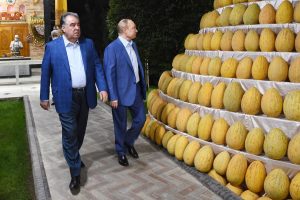In his first foreign trip since the invasion of Ukraine began on February 24, Russian President Vladimir Putin traveled to Tajikistan and Turkmenistan this week. In the former he met with Tajik President Emomali Rahmon for a stroll among the melons and in the latter attended the sixth Caspian Summit alongside the presidents of Turkmenistan, Kazakhstan, Iran, and Azerbaijan.
Afghanistan was a particular focus of Putin’s visit to Tajikistan, given Tajikistan’s long border with Afghanistan, Dushanbe’s difficult relations with the Taliban, and the fact that Russia’s largest military base abroad is in Tajikistan.
“We are doing everything so that the situation in that country normalizes,” Putin said of Afghanistan. “We are attempting to build relations with the political forces that control the situation,” he continued, referring to the Taliban which took control of Afghanistan in mid-August 2021. Putin then noted, “We are working from the premise that all ethnic groups in Afghanistan, as was already said, must properly participate in running the country.”
Putin also highlighted that a Taliban delegation attended the recent St. Petersburg International Economic Forum.
Another topic of discussion, as always when Russian and Tajik presidents speak, was the critical matter of Tajiks working in Russia. Last year, the number of Tajiks migrating into Russia for work hit an official high. Between January and September 2021 1.6 million Tajik citizens — about a quarter of the country’s entire population — traveled to Russia for work, and that’s just the official figure. In remarking on trade and economic ties during their recent meeting, Putin said Tajik migrant workers “make a significant contribution to the development of the economy of our country and are such a human bridge, a bridge of friendship between Russia and Tajikistan.” The same day Putin was in Tajikistan, June 28, the Russian Duma ratified an agreement signed last year regarding cooperation on pensions with Tajikistan.
On June 29, Putin continued on to Ashgabat for the sixth Caspian Summit, hosted by Turkmenistan’s new president, Serdar Beridmuhamedov. The summit comes four years after the last gathering, in 2018, during which the Caspian littoral states agreed on the sea’s legal status: It is, indeed, a sea and not a lake. Most importantly, the agreement settled in 2018 opened the door to possible pipelines across the sea. As I explained at the time:
Crucially, the recent agreement may open the door to pipeline projects that have long been hostage to the ambiguity surrounding the Caspian’s status. The convention reportedly stipulates that only countries through which a pipeline crosses would have to agree on the construction. The Trans-Caspian Pipeline (TCP), from Turkmenistan to Azerbaijan, has been opposed by both Russia and Iran. Russian and Iranian opposition has nominally (and rather unconvincingly) been rooted in environmental concerns; many analysts viewed Moscow and Tehran’s opposition as economically motivated, an effort to keep Turkmenistan from connecting to the European gas market via Azerbaijan.
Of course, the geopolitics have continued to shift since 2018. European dependence on Russian gas has become a flashpoint given the present conflict in Ukraine. While Europe moved to cut its imports of Russian oil, Moscow curbed exports of natural gas to Europe in retaliation for sanctions. Europe has advertised hopes to replace two-thirds of its Russian gas imports by the end of the year through a combination of liquified natural gas (LNG), renewables, pipeline diversification, and other methods. A trans-Caspian pipeline could theoretically help Europe diversify its natural gas supplies, but it remains a future prospect. In the interests of keeping what friends it has on side, Russia may set aside its objections. And Iran — which has also objected to the pipeline plan on similar grounds — could also benefit diplomatically from getting out of the way, not only with the Central Asian countries but European partners, too.
In a speech at the Caspian Summit, Putin noted that the five littoral states have “great opportunities for cooperation in the energy sector.” He noted agreements already implemented on joint exploration of the sea’s resources, which “makes it possible to reasonably and efficiently, respecting the interests of the parties, use the natural resources of the Caspian Sea both in traditional and innovative, alternative energy sectors.” Putin, however, did stress biodiversity and conversation issues, which have formed the bedrock of Moscow’s objection to new pipelines across the sea.
We’ll have to see what, if anything, comes from the Caspian Summit, though a landmark agreement like 2018 is unlikely. Nevertheless, Putin’s trip abroad is important for its signaling value alone. Although Russia has been condemned by a number of countries in the United Nations, and Putin is a pariah in Europe, Moscow retains important partners, especially in Asia. The warm welcome in Dushanbe and face-to-face meetings around the Caspian table in Ashgabat were a chance for Putin to reaffirm his network of partners at a critical moment.

































